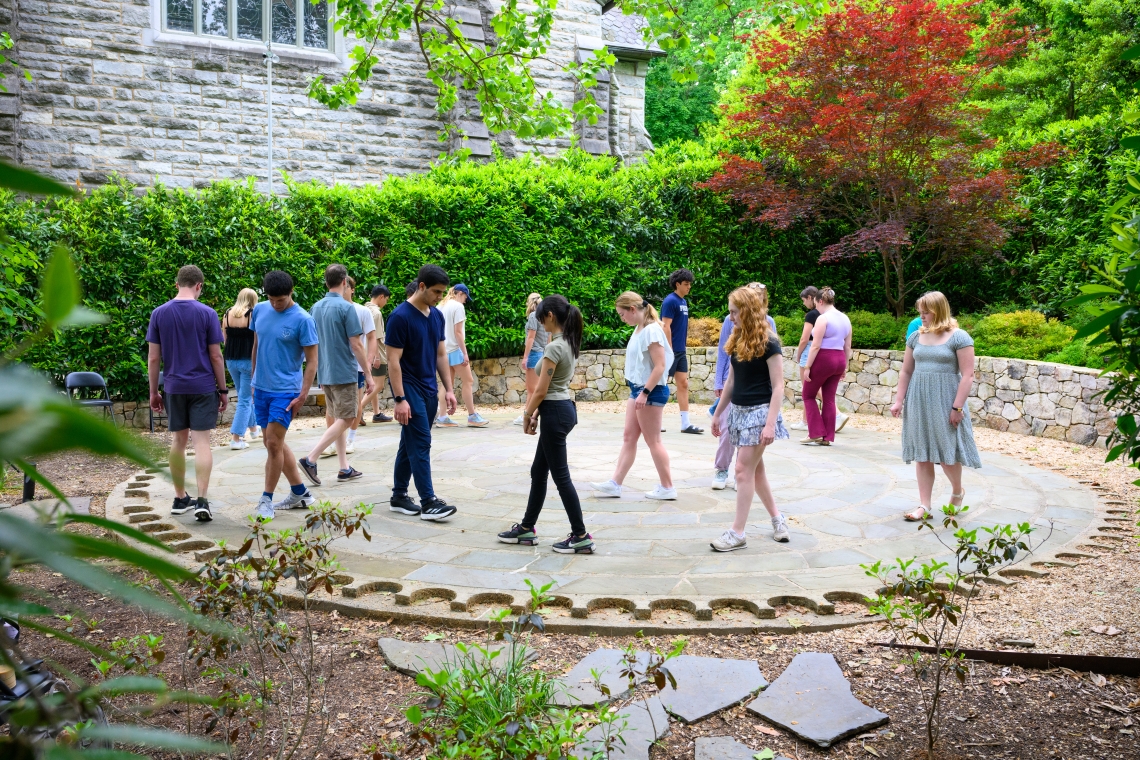
Contemplating Happiness The Exploring Happiness Spring Term Abroad class examined how happiness is defined, valued and pursued within different cultural contexts.
Is happiness a favorable balance of positive versus negative emotions, a feeling of contentment about our life circumstances or an assessment of how our status compares with some external standard? In recent years, Washington and Lee University professors of cognitive and behavioral science Karla Murdock and Wythe Whiting have studied happiness through the concept of affect valuation, which concerns the value that people place on various affective (emotional) experiences. Cultural norms influence which emotions we prize and which we avoid, and this may, in turn, influence psychological well-being. For instance, in a society that places a high value on energetic expressions of happiness (think: the Instagram effect), perfectly normal experiences of negative emotion may end up feeling subjectively abnormal or concerning because they conflict with the culture’s “ideal affect.”
Murdock, a clinical psychologist, and Whiting, a cognitive psychologist, have served as co-investigators in W&L’s Technology, Health and Cognition Lab for a decade. Along with a team of W&L students, they have investigated associations between psychological functioning, cell phone use, sleep quality and cognitive performance. College students today face a number of mental health challenges not experienced by previous generations. Murdock and Whiting created their Spring Term Abroad class, Exploring Happiness, to help students better understand the factors that both promote and hinder well-being.
“Spring Term is a great opportunity to take classes that are interesting to you and expand your perspective in the spirit of liberal arts education. This course has shaped the way I think about happiness and has added to my understanding as a CBSC major that I’ll carry with me into my everyday life and habits.” — Sarah Gabrielle Lynch ’24
The course exposed students to research in cognitive, affective, social and behavioral science as well as cross-cultural experiences. It was divided into two parts. First, students spent an intense two weeks in Lexington, Virginia, during which they read academic literature and wrote critical reflections about the science of happiness. During two subsequent weeks of experiential learning in Copenhagen, Denmark, they contextualized these concepts in a country that consistently ranks as one of the happiest in the world.
“With Spring Term, you have the time to take a beat and get the broader perspective and also dive into a specific topic instead of feeling pressure to cover a wide range — the how and why,” Whiting said. “You can take a different pace and have activities where we can go out and get to know each other; it’s a more enriching learning environment, and to be able to go abroad, it’s that much more special.”
One of the concepts studied in the class was “hygge,” a Scandinavian practice of prioritizing low-key time with friends and family in a quiet, cozy and relaxing environment without other distractions. Whereas American culture tends to place importance on “high-activation” emotions such as excitement, enthusiasm and cheerfulness, hygge emphasizes “low-activation” emotions such as calmness, sereneness and contentment.
“Part of the class is looking at how we value happiness, which is something literature calls ‘aspirational’ for us with the American dream,” Whiting said. “Whereas I think a lot of other countries, like Denmark, their goal is to not maximize every second but live a more contented life.”
The course curriculum included the science and practice of mindfulness as a mechanism for enhancing positive emotion and undoing physiological effects of negative emotion. As part of the coursework, students read essayettes from Ross Gay’s “The Book of Delights,” which chronicles the complexity of emotions experienced over the course of one year as Gay seeks to find goodness in each day. The students and professors shared their own observed delights with each other through a class blog. This practice was meant to draw attention to simple moments that bring pleasure and create stronger connections by sharing in another’s joy.
“I hope a big takeaway for students was an enhanced appreciation for the value of all our emotions,” Murdock said. “Thinking about our emotions in extreme or rigid ways can make even fleeting negative emotions feel overwhelming. Learning about the cognitive and physiological functions of emotions can help us to understand and regulate our emotions in more nuanced ways.”
The last class activity before they left for Denmark was a group meditation walk in the labyrinth at Grace Episcopal Church on the edge of campus. For the exercise, Murdock led the group in walking the circular stone path to the center of the labyrinth and then back out again. Every 30 seconds, another class member would enter the labyrinth, with Whiting going last. As more people entered the circle, the participants had to figure out how to maneuver around one another in an increasingly crowded space while maintaining their own focus.
“The labyrinth is a perfect place to practice a peaceful walking meditation by yourself. In company, it becomes an opportunity to intuitively sense and adjust to other people without words or eye contact,” Murdock said. “It feels good to be part of a moving, breathing organism that can effortlessly adapt to everyone’s needs, and this was a perfect way to launch our study abroad journey.”
Recent graduate Cami Fischmann ’24 was a pre-med student with a neuroscience major and minor in poverty and human capability studies. After a medical scribing and research fellowship at Stanford University, she’ll apply to medical school with the goal of working in internal medicine.
“Something that’s always drawn me to medicine is the interpersonal aspect and learning more about what makes us tick and how we think,” Fischmann said. “It’s really interesting and also really relevant to being a successful physician.”
Fischmann took four classes with Whiting, her adviser, during her time at W&L, and she also served as a research student in Whiting and Murdock’s lab. The opportunities for hands-on, intensive learning and closeknit relationships with students and professors are a few of the benefits from attending a small liberal arts school, she said. A few of her classmates from Whiting’s Evolutionary Psychology Spring Term class her sophomore year reunited to take the Exploring Happiness class.
“Spring Term is a unique class structure; it’s so intensive,” Fischmann said. “You really get to know each other, and I feel like you get closer with those classmates than you do during a full semester.”
Some main takeaways from the class for the future doctor are the role that social connection plays in both mental and physical health and how negative emotions can make positive emotions that much more fulfilling.
“I’ve come to understand the importance of things like trust, happiness and positivity have on your physical and mental health, and I like building that toolset of perspectives that can translate to a future medical career,” she said. “Dr. Whiting’s classes have helped me with more critical thinking and using my own strengths as a student in figuring out how to think more uniquely and creatively, which is important for problem-solving. I think that’s the point of a liberal arts education — to find your own way of thinking.”
In the mornings in Copenhagen, the group heard from Danish Institute of Study Abroad (DIS) faculty members regarding aspects of Danish culture such as its egalitarian ideology, focus on nature, political and social welfare systems, family life and education. The afternoon curriculum included activities and field trips that allowed the students to engage with the culture, including a historic walking tour, visiting the Happiness Museum and — a highlight for many students — participating in the Human Library, in which people volunteer as “Human Books” to share their viewpoints and experiences with “Readers” in a small group format.
“That experience was eye-opening for many of us,” said Sarah Gabrielle Lynch ’24. “We were able to ask questions and engage with some topics that aren’t often discussed as well as meet people who are simultaneously so different and similar to us.”
Lynch doubled majored in music — with a focus on performance — and cognitive and behavioral science and plans to apply to graduate school for opera performance and conducting. She said her CBSC studies inform the way she approaches performing and teaching.
“The ways people view and value happiness have a direct effect on whether they are happy, and happiness and life fulfillment have direct effects on people’s mental and physical health,” she said. “Performing can be quite stressful and even demoralizing if you don’t have a feeling of personal security, life purpose and self-assurance, and the concepts covered in this course can help cultivate those skills.”
Some of Lynch’s favorite activities during the course were opportunities to connect with others, including four-hour dinners with local families, and sharing delights on the class blog. She also appreciated an activity on their second-to-last day in Copenhagen during which students were invited to approach each of their classmates and describe a signature strength they saw in that person.
“It sounds simple, but it was really special to give people in our class, several of whom you’ve only known for four weeks, a compliment,” she said. “One thing I love about Spring Term classes are the variety of class years and majors within a given course. This leads to varied perspectives in the classroom and the opportunity to make friends across majors and class years.”
Through her conversations and experiences with the Danish people, Lynch developed an even better understanding of course concepts such as the difference between eudaimonic happiness (a sense of meaning, purpose and satisfaction with your life) and hedonic happiness (feelings of pleasure or enjoyment).
“Spring Term is a great opportunity to take classes that are interesting to you and expand your perspective in the spirit of liberal arts education,” Lynch said. “This course has shaped the way I think about happiness and has added to my understanding as a CBSC major that I’ll carry with me into my everyday life and habits.”
“I believe we often learn more, and become our best selves, when we are a few steps outside of our comfort zone and willing to be genuinely curious,” Murdock said. “Our students showed up ready to think deeply about the nature of well-being. They were game to show some vulnerability, build new relationships with each other and test their existing assumptions about how emotions work. We all grew through this experience, and I think that’s the superpower of the Spring Term.”
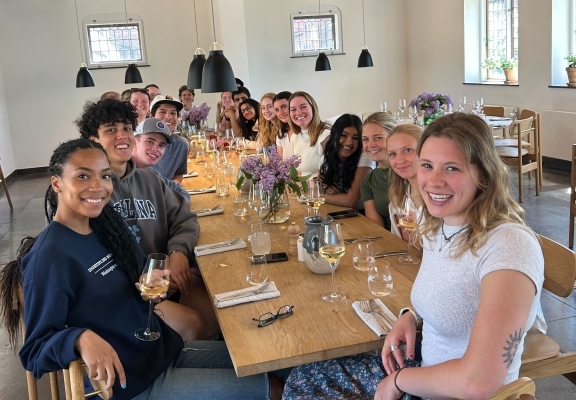 The group enjoys lunch at Frederiksborg Castle.
The group enjoys lunch at Frederiksborg Castle.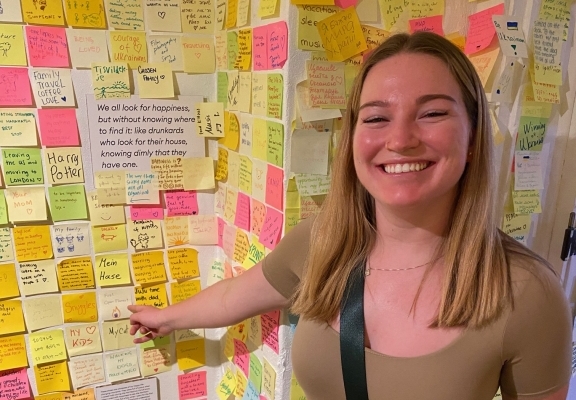 Cami Fischmann ’24 reads some of the visitor notes at the Happiness Museum.
Cami Fischmann ’24 reads some of the visitor notes at the Happiness Museum.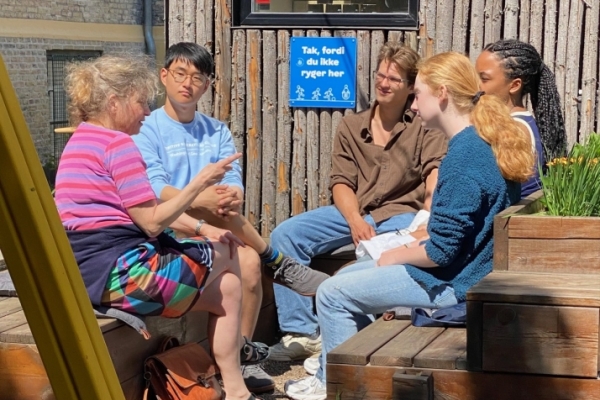 Joe Lee ’26, Devlin Daugherty ’27, Aryel Jacques ’24 and Sarah Clark ’26 learn more about one of the “Human Books” (left) during the Human Library experience.
Joe Lee ’26, Devlin Daugherty ’27, Aryel Jacques ’24 and Sarah Clark ’26 learn more about one of the “Human Books” (left) during the Human Library experience.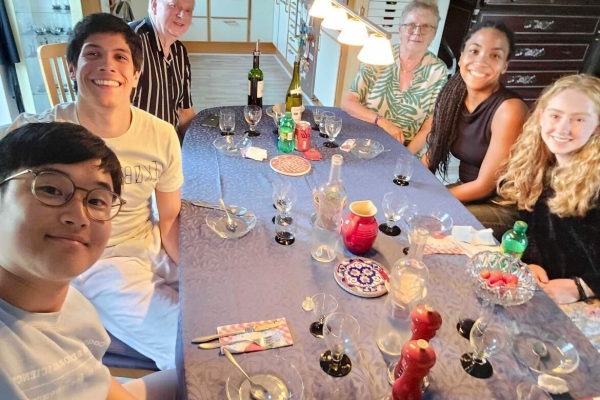 Students learn more about Danish life during dinner with one of their host families.
Students learn more about Danish life during dinner with one of their host families.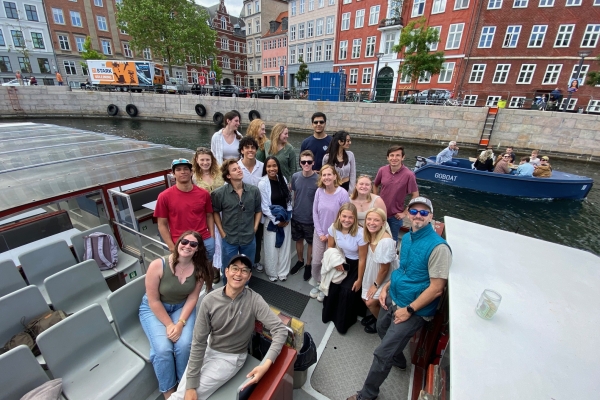 The class takes a boat tour of the Copenhagen canals.
The class takes a boat tour of the Copenhagen canals.
You must be logged in to post a comment.